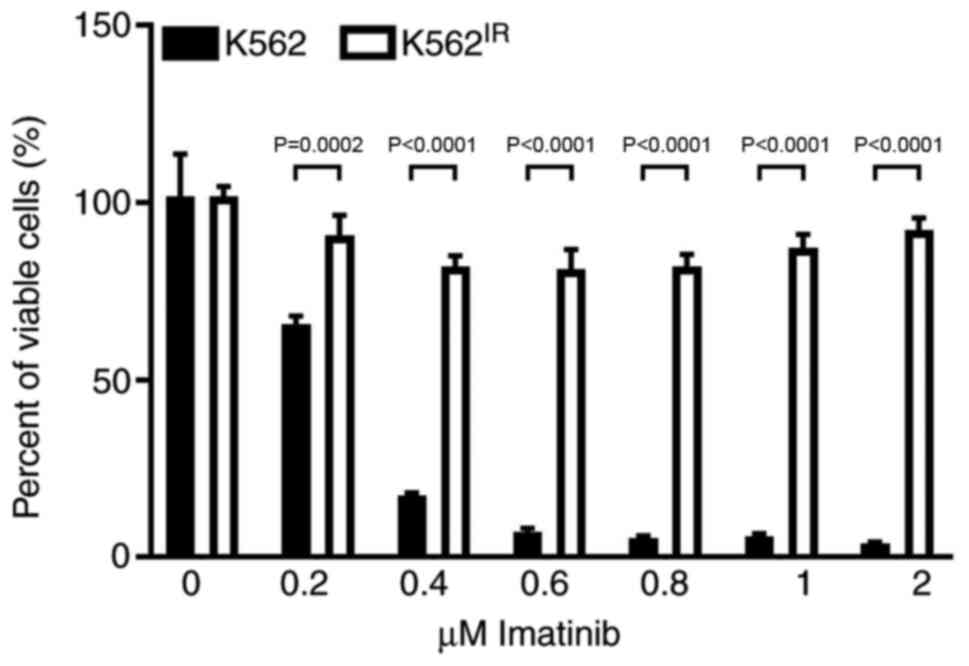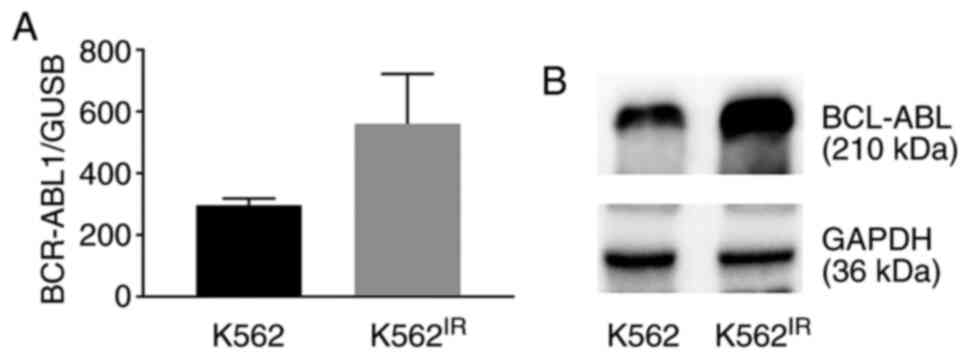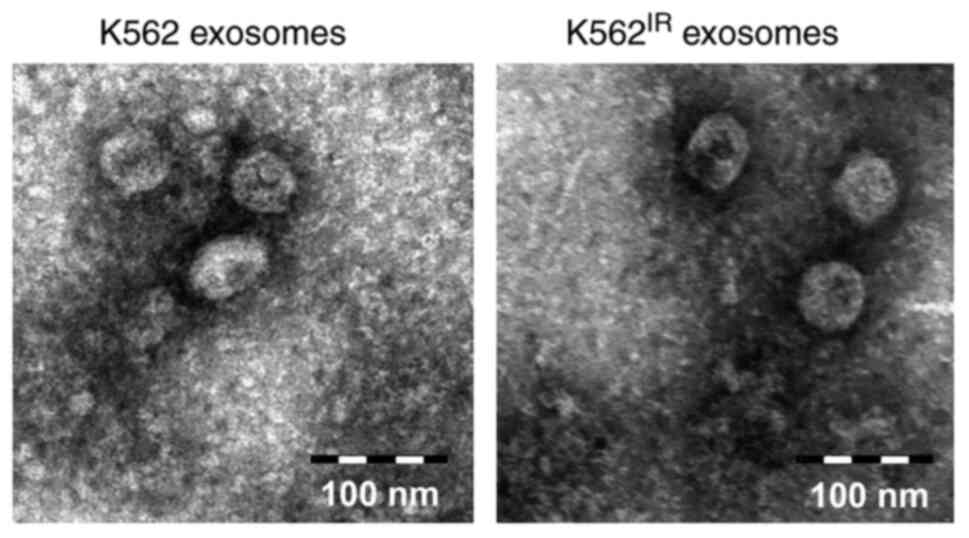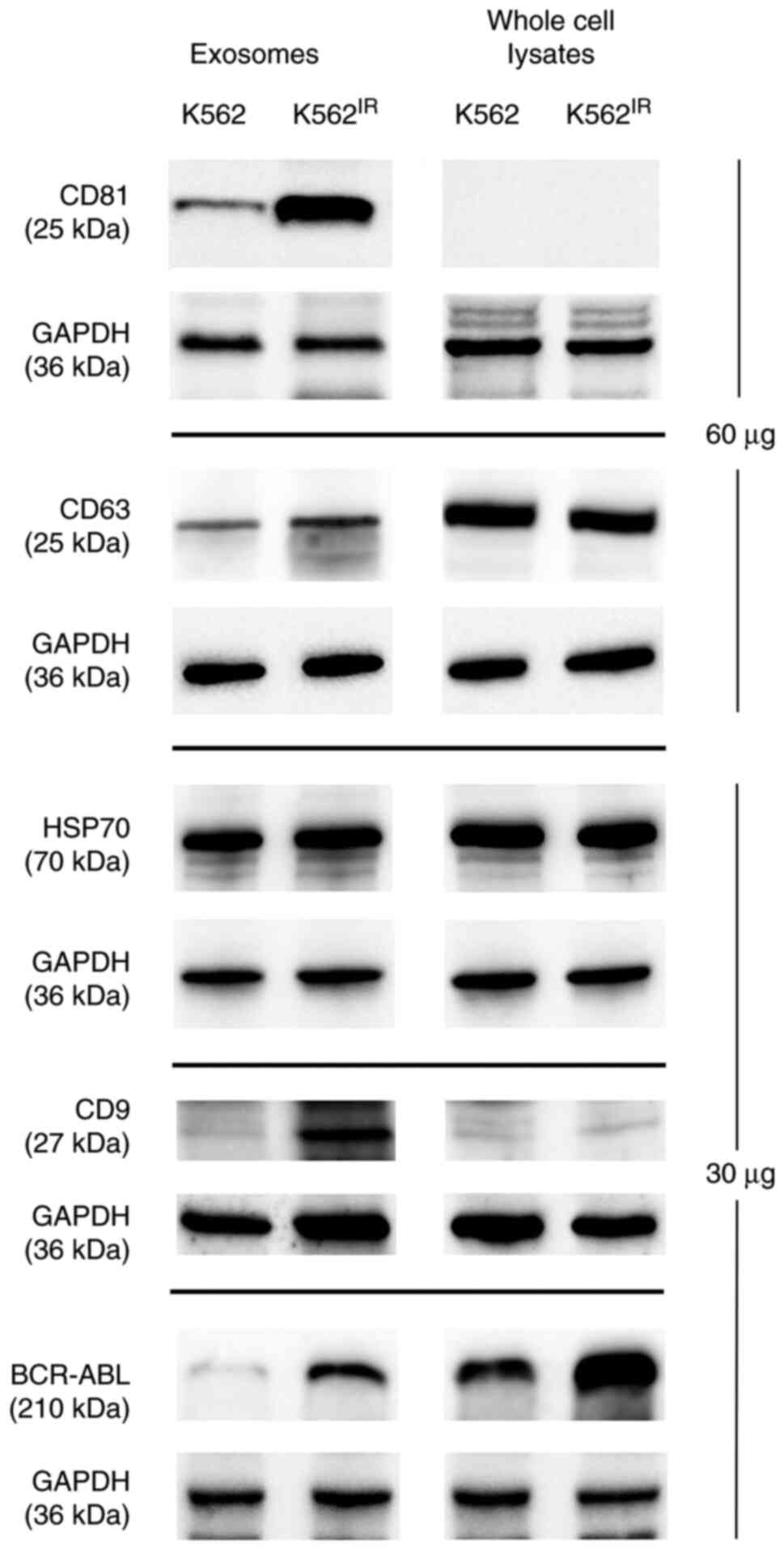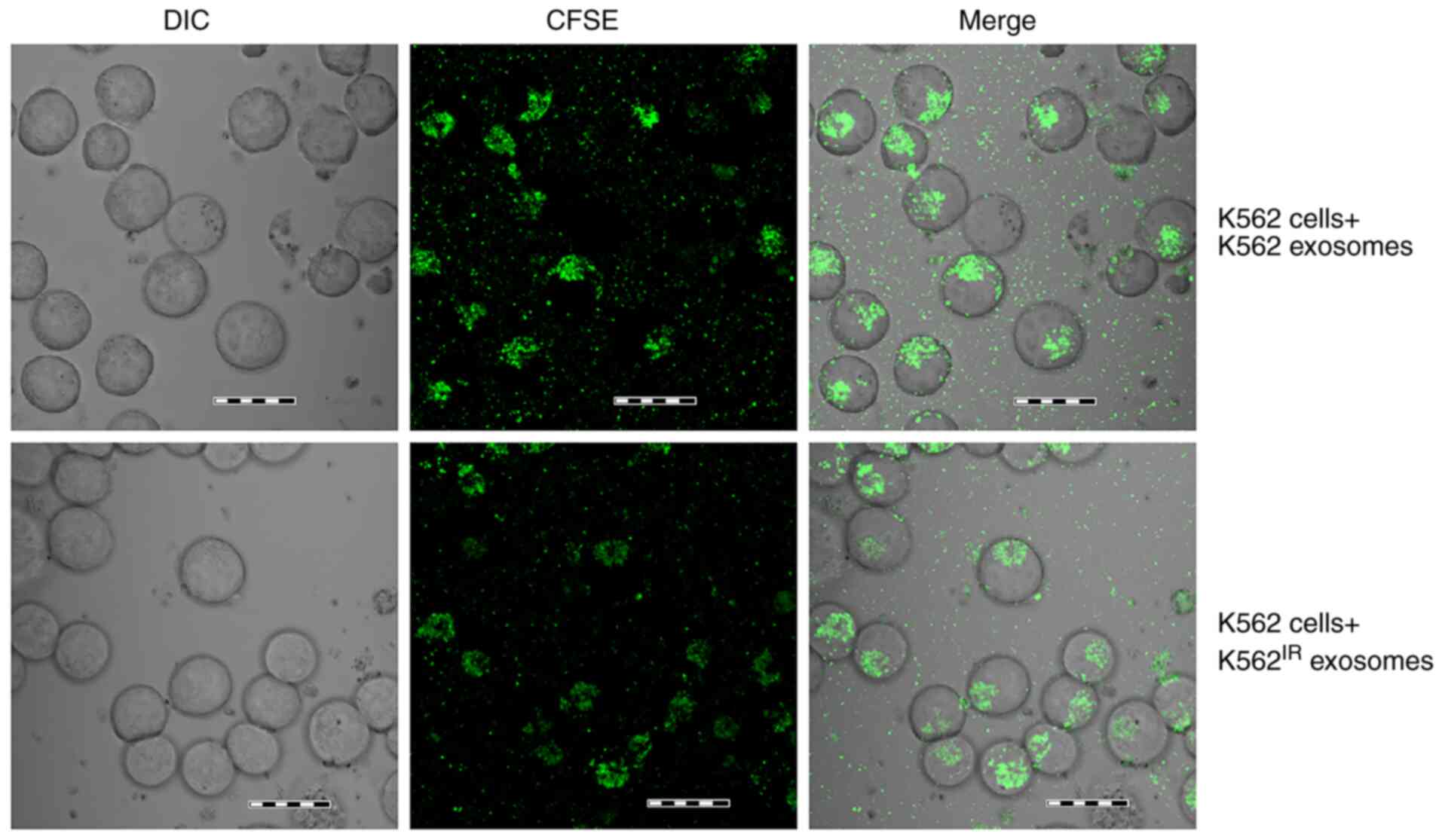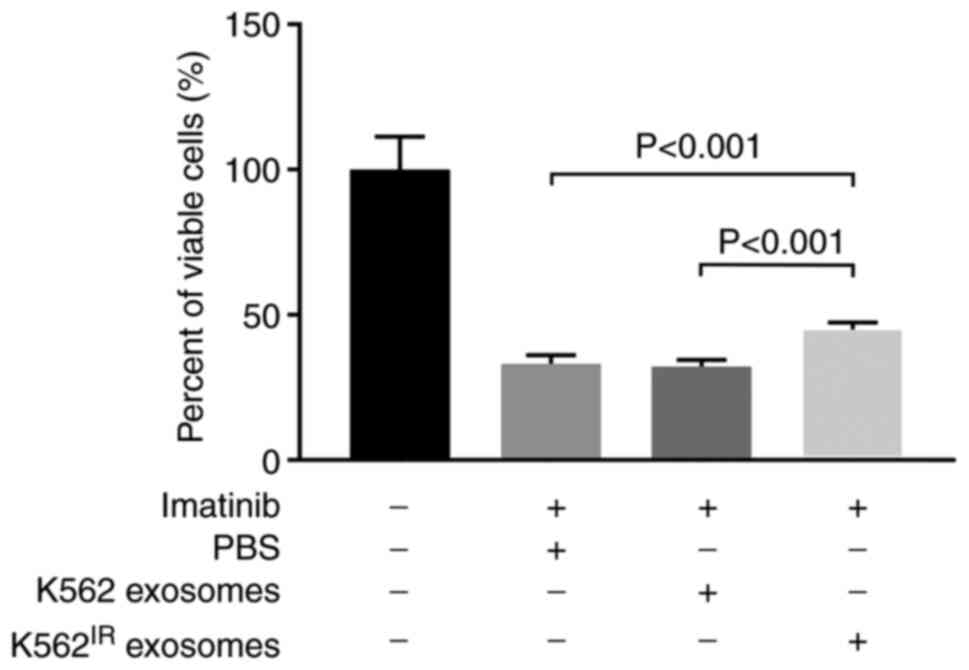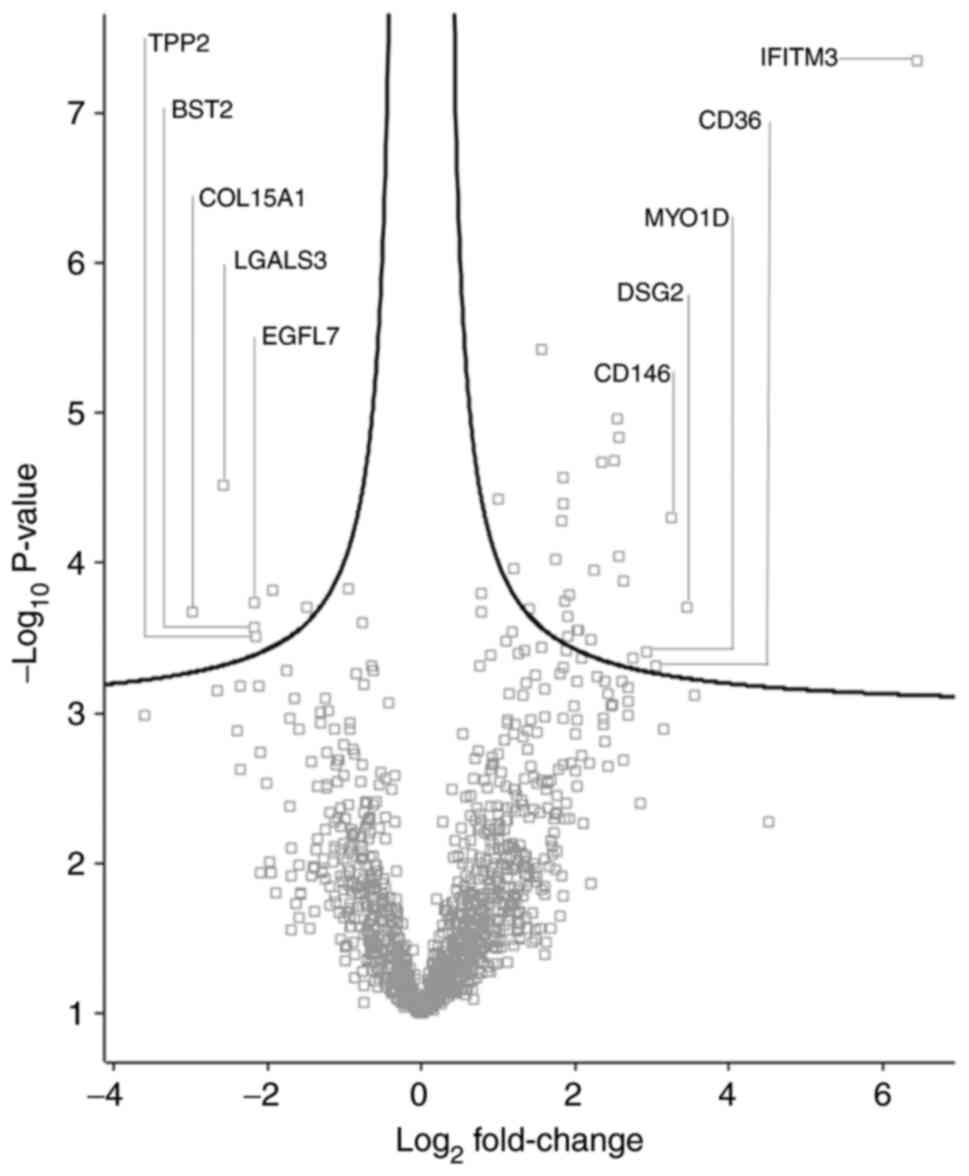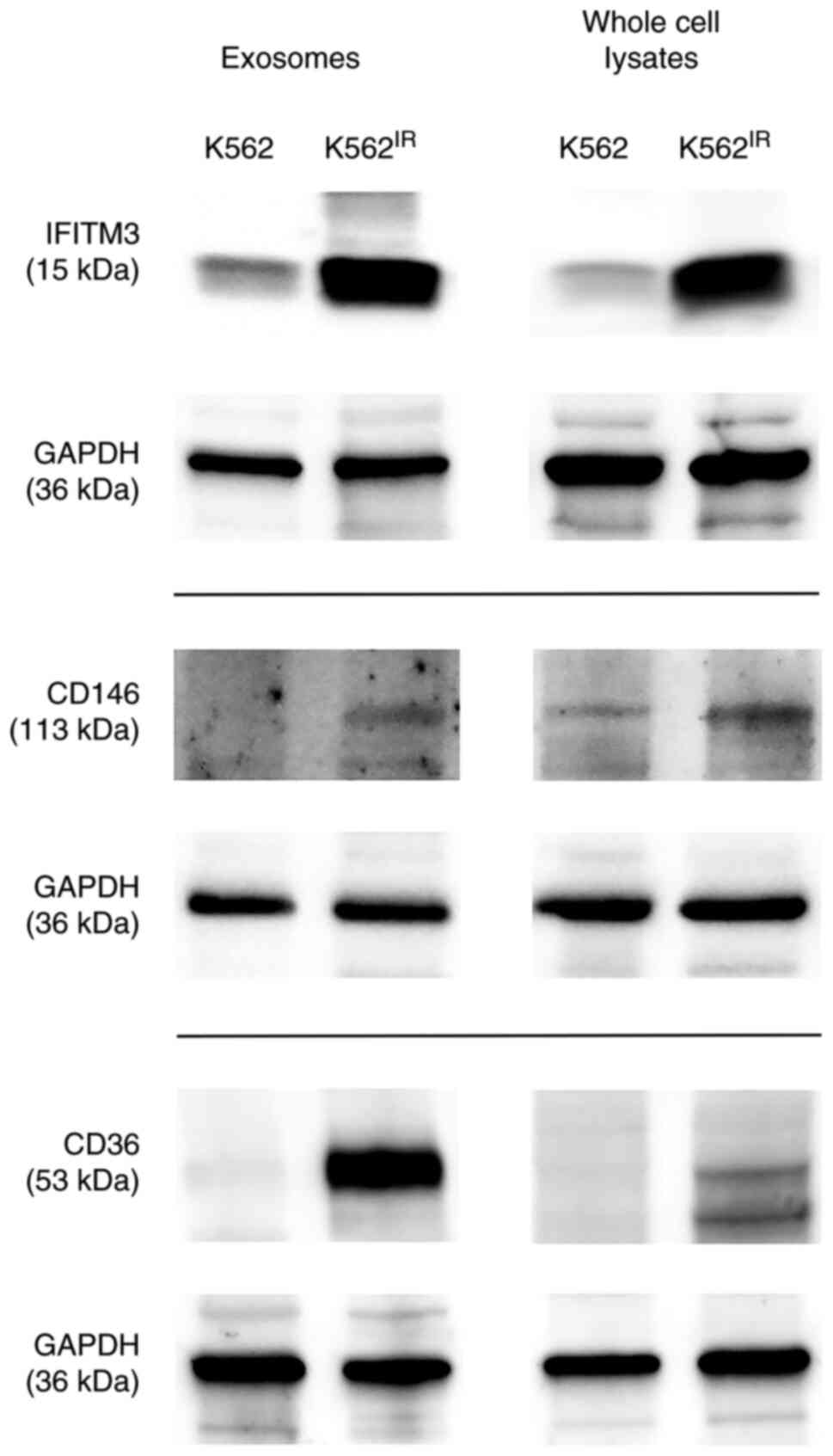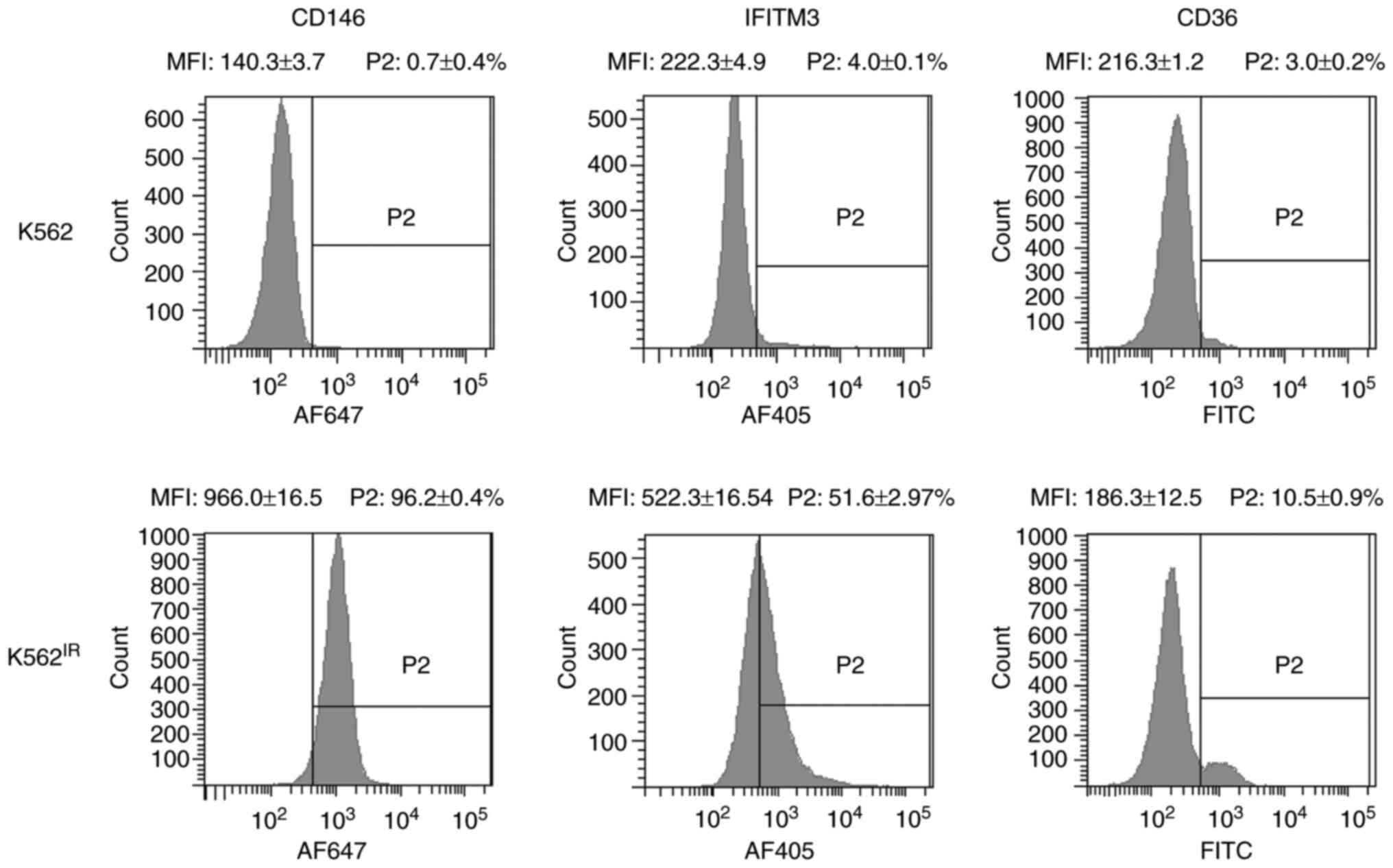|
1
|
Nowell PC and Hungerford DA: A minute
chromosome in human chronic granulocytic leukemia. Science.
132:14971960.
|
|
2
|
Rowley JD: Letter: A new consistent
chromosomal abnormality in chronic myelogenous leukemia identified
by quinacrine fluorescence and Giemsa staining. Nature.
243:290–293. 1973. View Article : Google Scholar : PubMed/NCBI
|
|
3
|
Heisterkamp N, Stephenson JR, Groffen J,
Hansen PF, de Klein A, Bartram CR and Grosveld G: Localization of
the c-ab1 oncogene adjacent to a translocation break point in
chronic myelocytic leukaemia. Nature. 306:239–242. 1983. View Article : Google Scholar : PubMed/NCBI
|
|
4
|
Druker BJ, Talpaz M, Resta DJ, Peng B,
Buchdunger E, Ford JM, Lydon NB, Kantarjian H, Capdeville R,
Ohno-Jones S and Sawyers CL: Efficacy and safety of a specific
inhibitor of the BCR-ABL tyrosine kinase in chronic myeloid
leukemia. N Engl J Med. 344:1031–1037. 2001. View Article : Google Scholar : PubMed/NCBI
|
|
5
|
Lahaye T, Riehm B, Berger U, Paschka P,
Müller MC, Kreil S, Merx K, Schwindel U, Schoch C, Hehlmann R and
Hochhaus A: Response and resistance in 300 patients with
BCR-ABL-positive leukemias treated with imatinib in a single
center: A 4.5-year follow-up. Cancer. 103:1659–1669. 2005.
View Article : Google Scholar : PubMed/NCBI
|
|
6
|
Gadzicki D, von Neuhoff N, Steinemann D,
Just M, Büsche G, Kreipe H, Wilkens L and Schlegelberger B: BCR-ABL
gene amplifi-cation and overexpression in a patient with chronic
myeloid leukemia treated with imatinib. Cancer Genet Cytogenet.
159:164–167. 2005. View Article : Google Scholar : PubMed/NCBI
|
|
7
|
Gorre ME, Mohammed M, Ellwood K, Hsu N,
Paquette R, Rao PN and Sawyers CL: Clinical resistance to STI-571
cancer therapy caused by BCR-ABL gene mutation or amplification.
Science. 293:876–880. 2001. View Article : Google Scholar : PubMed/NCBI
|
|
8
|
Mahon FX, Deininger MW, Schultheis B,
Chabrol J, Reiffers J, Goldman JM and Melo JV: Selection and
characterization of BCR-ABL positive cell lines with differential
sensitivity to the tyrosine kinase inhibitor STI571: Diverse
mechanisms of resistance. Blood. 96:1070–1079. 2000. View Article : Google Scholar : PubMed/NCBI
|
|
9
|
Steinbichler TB, Dudas J, Skvortsov S,
Ganswindt U, Riechelmann H and Skvortsova II: Therapy resistance
mediated by exosomes. Mol Cancer. 18:582019. View Article : Google Scholar : PubMed/NCBI
|
|
10
|
Nehrbas J, Butler JT, Chen DW and Kurre P:
Extracellular vesicles and chemotherapy resistance in the AML
microenvironment. Front Oncol. 10:902020. View Article : Google Scholar : PubMed/NCBI
|
|
11
|
Johnstone RM, Adam M, Hammond JR, Orr L
and Turbide C: Vesicle formation during reticulocyte maturation.
Association of plasma membrane activities with released vesicles
(exosomes). J Biol Chem. 262:9412–9420. 1987. View Article : Google Scholar : PubMed/NCBI
|
|
12
|
Valadi H, Ekstrom K, Bossios A, Sjostrand
M, Lee JJ and Lotvall JO: Exosome-mediated transfer of mRNAs and
microRNAs is a novel mechanism of genetic exchange between cells.
Nat Cell Biol. 9:654–659. 2007. View Article : Google Scholar : PubMed/NCBI
|
|
13
|
Thakur BK, Zhang H, Becker A, Matei I,
Huang Y, Costa-Silva B, Zheng Y, Hoshino A, Brazier H, Xiang J, et
al: Double-stranded DNA in exosomes: A novel biomarker in cancer
detection. Cell Res. 24:766–769. 2014. View Article : Google Scholar : PubMed/NCBI
|
|
14
|
Prada I and Meldolesi J: Binding and
Fusion of Extracellular vesicles to the plasma membrane of their
cell targets. Int J Mol Sci. 17:12962016. View Article : Google Scholar :
|
|
15
|
Maacha S, Bhat AA, Jimenez L, Raza A,
Haris M, Uddin S and Grivel JC: Extracellular vesicles-mediated
intercellular communication: Roles in the tumor microenvironment
and anti-cancer drug resistance. Mol Cancer. 18:552019. View Article : Google Scholar : PubMed/NCBI
|
|
16
|
Raimondo S, Saieva L, Corrado C, Fontana
S, Flugy A, Rizzo A, De Leo G and Alessandro R: Chronic myeloid
leukemia-derived exosomes promote tumor growth through an autocrine
mechanism. Cell Commun Signal. 13:82015. View Article : Google Scholar : PubMed/NCBI
|
|
17
|
Corrado C, Raimondo S, Saieva L, Flugy AM,
De Leo G and Alessandro R: Exosome-mediated crosstalk between
chronic myelogenous leukemia cells and human bone marrow stromal
cells triggers an interleukin 8-dependent survival of leukemia
cells. Cancer Lett. 348:71–76. 2014. View Article : Google Scholar : PubMed/NCBI
|
|
18
|
Cai J, Wu G, Tan X, Han Y, Chen C, Li C,
Wang N, Zou X, Chen X, Zhou F, et al: Transferred BCR/ABL DNA from
K562 extracellular vesicles causes chronic myeloid leukemia in
immu-nodeficient mice. PLoS One. 9:e1052002014. View Article : Google Scholar
|
|
19
|
Jafarzadeh N, Safari Z, Pornour M,
Amirizadeh N, Forouzandeh Moghadam M and Sadeghizadeh M: Alteration
of cellular and immune-related properties of bone marrow
mesenchymal stem cells and macrophages by K562 chronic myeloid
leukemia cell derived exosomes. J Cell Physiol. 234:3697–3710.
2019. View Article : Google Scholar
|
|
20
|
Taverna S, Flugy A, Saieva L, Kohn EC,
Santoro A, Meraviglia S, De Leo G and Alessandro R: Role of
exosomes released by chronic myelogenous leukemia cells in
angiogenesis. Int J cancer. 130:2033–2043. 2012. View Article : Google Scholar
|
|
21
|
Mineo M, Garfield SH, Taverna S, Flugy A,
De Leo G, Alessandro R and Kohn EC: Exosomes released by K562
chronic myeloid leukemia cells promote angiogenesis in a
Src-dependent fashion. Angiogenesis. 15:33–45. 2012. View Article : Google Scholar
|
|
22
|
Min QH, Wang XZ, Zhang J, Chen QG, Li SQ,
Liu XQ, Li J, Liu J, Yang WM, Jiang YH, et al: Exosomes derived
from imatinib-resistant chronic myeloid leukemia cells mediate a
horizontal transfer of drug-resistant trait by delivering miR365.
Exp Cell Res. 362:386–393. 2018. View Article : Google Scholar
|
|
23
|
Toman O, Kabickova T, Vit O, Fiser R,
Polakova KM, Zach J, Linhartova J, Vyoral D and Petrak J: Proteomic
analysis of imatinib-resistant CML-T1 cells reveals calcium
homeostasis as a potential therapeutic target. Oncol Rep.
36:1258–1268. 2016. View Article : Google Scholar : PubMed/NCBI
|
|
24
|
Machova Polakova K, Kulvait V, Benesova A,
Linhartova J, Klamova H, Jaruskova M, de Benedittis C, Haferlach T,
Baccarani M, Martinelli G, et al: Next-generation deep sequencing
improves detection of BCR-ABL1 kinase domain mutations emerging
under tyrosine kinase inhibitor treatment of chronic myeloid
leukemia patients in chronic phase. J Cancer Res Clin Oncol.
141:887–899. 2015. View Article : Google Scholar
|
|
25
|
Kohlmann A, Grossmann V, Nadarajah N and
Haferlach T: Next-generation sequencing-feasibility and
practicality in haematology. Br J Haematol. 160:736–753. 2013.
View Article : Google Scholar : PubMed/NCBI
|
|
26
|
Linhartova J, Hovorkova L, Soverini S,
Benesova A, Jaruskova M, Klamova H, Zuna J and Machova Polakova K:
Characterization of 46 patient-specific BCR-ABL1 fusions and
detection of SNPs upstream and downstream the breakpoints in
chronic myeloid leukemia using next generation sequencing. Mol
Cancer. 14:892015. View Article : Google Scholar : PubMed/NCBI
|
|
27
|
Moravcova J, Rulcova J, Polaková KM and
Klamova H: Control genes in international standardization of
real-time RT-PCR for BCR-ABL. Leuk Res. 33:582–584. 2009.
View Article : Google Scholar
|
|
28
|
Rulcova J, Zmekova V, Zemanova Z, Klamova
H and Moravcova J: The effect of total-ABL, GUS and B2M control
genes on BCR-ABL monitoring by real-time RT-PCR. Leuk Res.
31:483–491. 2007. View Article : Google Scholar
|
|
29
|
Gabert J, Beillard E, van der Velden VH,
Bi W, Grimwade D, Pallisgaard N, Barbany G, Cazzaniga G, Cayuela
JM, Cavé H, et al: Standardization and quality control studies of
'real-time' quantitative reverse transcriptase polymerase chain
reaction of fusion gene transcripts for residual disease detection
in leukemia-a Europe Against Cancer program. Leukemia.
17:2318–2357. 2003. View Article : Google Scholar : PubMed/NCBI
|
|
30
|
Müller MC, Cross NCP, Erben P, Schenk P,
Hanfstein B, Ernst T, Hehlmann R, Branford S, Saglio G and Hochhaus
A: Harmonization of molecular monitoring of CML therapy in Europe.
Leukemia. 23:1957–1963. 2009. View Article : Google Scholar : PubMed/NCBI
|
|
31
|
Deprez L, Mazoua S, Corbisier P, Trapmann
S, Schimmel H, White H, Cross N and Emons H: The certification of
the copy number concentration of solutions of plasmid DNA
containing a BCR- ABL b3a2 transcript fragment. Certified reference
material: ERM-AD623a, ERM-AD623b, ERM-AD623c, ERM-AD623d,
ERM-AD623e ERM-AD623f. Luxembourg: Publications Office of the
European Union; 2012. Report number EUR 25248. ISBN:
978-92-79-23343-22012
|
|
32
|
White H, Deprez L, Corbisier P, Hall V,
Lin F, Mazoua S, Trapmann S, Aggerholm A, Andrikovics H, Akiki S,
et al: A certified plasmid reference material for the
standardisation of BCR-ABL1 mRNA quantification by real-time
quantitative PCR. Leukemia. 29:369–376. 2015. View Article : Google Scholar
|
|
33
|
Thery C, Amigorena S, Raposo G and Clayton
A: Isolation and characterization of exosomes from cell culture
supernatants and biological fluids. Curr Protoc Cell Biol Chapter.
3:Unit 3.22. 2006.
|
|
34
|
McDowell EM and Trump BF: Histologic
fixatives suitable for diagnostic light and electron microscopy.
Arch Pathol Lab Med. 100:405–414. 1976.PubMed/NCBI
|
|
35
|
Wisniewski JR, Zougman A and Mann M:
Combination of FASP and StageTip-based fractionation allows
in-depth analysis of the hippocampal membrane proteome. J Proteome
Res. 8:5674–5678. 2009. View Article : Google Scholar : PubMed/NCBI
|
|
36
|
Cox J and Mann M: MaxQuant enables high
peptide iden-tification rates, individualized p.p.b-range mass
accuracies and proteome-wide protein quantification. Nat
Biotechnol. 26:1367–1372. 2008. View Article : Google Scholar : PubMed/NCBI
|
|
37
|
Cox J, Neuhauser N, Michalski A, Scheltema
RA, Olsen JV and Mann M: Andromeda: A peptide search engine
integrated into the MaxQuant environment. J Proteome Res.
10:1794–1805. 2011. View Article : Google Scholar : PubMed/NCBI
|
|
38
|
Cox J, Hein MY, Luber CA, Paron I, Nagaraj
N and Mann M: Accurate proteome-wide label-free quantification by
delayed normalization and maximal peptide ratio extraction, termed
MaxLFQ. Mol Cell Proteomics. 13:2513–2526. 2014. View Article : Google Scholar : PubMed/NCBI
|
|
39
|
Tyanova S, Temu T, Sinitcyn P, Carlson A,
Hein MY, Geiger T, Mann M and Cox J: The Perseus computational
platform for comprehensive analysis of (prote)omics data. Nat
Methods. 13:731–740. 2016. View Article : Google Scholar : PubMed/NCBI
|
|
40
|
Chawade A, Alexandersson E and Levander F:
Normalyzer: A tool for rapid evaluation of normalization methods
for omics data sets. J Proteome Res. 13:3114–3120. 2014. View Article : Google Scholar : PubMed/NCBI
|
|
41
|
Waas M, Snarrenberg ST, Littrell J, Jones
Lipinski RA, Hansen PA, Corbett JA and Gundry RL: SurfaceGenie: A
web-based application for prioritizing cell-type specific marker
candidates. Bioinformatics. 36:3447–3456. 2020. View Article : Google Scholar : PubMed/NCBI
|
|
42
|
Kowal J, Arras G, Colombo M, Jouve M,
Morath JP, Primdal-Bengtson B, Dingli F, Loew D, Tkach M and Théry
C: Proteomic comparison defines novel markers to characterize
heterogeneous populations of extracellular vesicle subtypes. Proc
Natl Acad Sci USA. 113:E968–E977. 2016. View Article : Google Scholar : PubMed/NCBI
|
|
43
|
Tadokoro H, Umezu T, Ohyashiki K, Hirano T
and Ohyashiki JH: Exosomes derived from hypoxic leukemia cells
enhance tube formation in endothelial cells. J Biol Chem.
288:34343–34351. 2013. View Article : Google Scholar : PubMed/NCBI
|
|
44
|
Chandran RK, Geetha N, Sakthivel KM,
Aswathy CG, Gopinath P, Raj TVA, Priya G, Nair JKKM and Sreedharan
H: Genomic amplification of BCR-ABL1 fusion gene and its impact on
the disease progression mechanism in patients with chronic
myelogenous leukemia. Gene. 686:85–91. 2019. View Article : Google Scholar
|
|
45
|
Hu J, Wang S, Zhao Y, Guo Q, Zhang D, Chen
J, Li J, Fei Q and Sun Y: Mechanism and biological significance of
the overexpression of IFITM3 in gastric cancer. Oncol Rep.
32:2648–2656. 2014. View Article : Google Scholar : PubMed/NCBI
|
|
46
|
Zhang D, Wang H, He H, Niu H and Li Y:
Interferon induced transmembrane protein 3 regulates the growth and
invasion of human lung adenocarcinoma. Thorac Cancer. 8:337–343.
2017. View Article : Google Scholar : PubMed/NCBI
|
|
47
|
Yang M, Gao H, Chen P, Jia J and Wu S:
Knockdown of interferon-induced transmembrane protein 3 expression
suppresses breast cancer cell growth and colony formation and
affects the cell cycle. Oncol Rep. 30:171–178. 2013. View Article : Google Scholar : PubMed/NCBI
|
|
48
|
Gan CP, Sam KK, Yee PS, Zainal NS, Lee
BKB, Abdul Rahman ZA, Patel V, Tan AC, Zain RB and Cheong SC:
IFITM3 knockdown reduces the expression of CCND1 and CDK4 and
suppresses the growth of oral squamous cell carcinoma cells. Cell
Oncol (Dordr). 42:477–490. 2019. View Article : Google Scholar
|
|
49
|
Liu Y, Lu R, Cui W, Pang Y, Liu C, Cui L,
Qian T, Quan L, Dai Y, Jiao Y, et al: High IFITM3 expression
predicts adverse prognosis in acute myeloid leukemia. Cancer Gene
Ther. 27:38–44. 2019. View Article : Google Scholar : PubMed/NCBI
|
|
50
|
Lehmann JM, Riethmuller G and Johnson JP:
MUC18, a marker of tumor progression in human melanoma, shows
sequence similarity to the neural cell adhesion molecules of the
immuno-globulin superfamily. Proc Natl Acad Sci USA. 86:9891–9895.
1989. View Article : Google Scholar
|
|
51
|
Lei X, Guan CW, Song Y and Wang H: The
multifaceted role of CD146/MCAM in the promotion of melanoma
progression. Cancer Cell Int. 15:32015. View Article : Google Scholar : PubMed/NCBI
|
|
52
|
Wu GJ and Dickerson EB: Frequent and
increased expression of human METCAM/MUC18 in cancer tissues and
metastatic lesions is associated with the clinical progression of
human ovarian carcinoma. Taiwan J Obstet Gynecol. 53:509–517. 2014.
View Article : Google Scholar : PubMed/NCBI
|
|
53
|
Watson-Hurst K and Becker D: The role of
N-cadherin, MCAM and beta3 integrin in melanoma progression,
proliferation, migration and invasion. Cancer Biol Ther.
5:1375–1382. 2006. View Article : Google Scholar : PubMed/NCBI
|
|
54
|
Tripathi SC, Fahrmann JF, Celiktas M,
Aguilar M, Marini KD, Jolly MK, Katayama H, Wang H, Murage EN,
Dennison JB, et al: MCAM Mediates Chemoresistance in Small-Cell
Lung Cancer via the PI3K/AKT/SOX2 signaling pathway. Cancer Res.
77:4414–4425. 2017. View Article : Google Scholar : PubMed/NCBI
|
|
55
|
Liang YK, Zeng D, Xiao YS, Wu Y, Ouyang
YX, Chen M, Li YC, Lin HY, Wei XL, Zhang YQ, et al: MCAM/CD146
promotes tamoxifen resistance in breast cancer cells through
induction of epithelial-mesenchymal transition, decreased ERα
expression and AKT activation. Cancer Lett. 386:65–76. 2017.
View Article : Google Scholar
|
|
56
|
Ye H, Adane B, Khan N, Sullivan T,
Minhajuddin M, Gasparetto M, Stevens B, Pei S, Balys M, Ashton JM,
et al: Leukemic stem cells evade chemotherapy by metabolic
adaptation to an adipose tissue niche. Cell Stem Cell. 19:23–37.
2016. View Article : Google Scholar : PubMed/NCBI
|
|
57
|
Landberg N, von Palffy S, Askmyr M,
Lilljebjörn H, Sandén C, Rissler M, Mustjoki S, Hjorth-Hansen H,
Richter J, Ågerstam H, et al: CD36 defines primitive chronic
myeloid leukemia cells less responsive to imatinib but vulnerable
to anti-body-based therapeutic targeting. Haematologica.
103:447–455. 2018. View Article : Google Scholar :
|
|
58
|
Bailey CC, Zhong G, Huang IC and Farzan M:
IFITM-Family Proteins: The Cell's First Line of Antiviral Defense.
Annu Rev Virol. 1:261–283. 2014. View Article : Google Scholar
|
|
59
|
Wrensch F, Winkler M and Pöhlmann S: IFITM
proteins inhibit entry driven by the MERS-coronavirus spike
protein: Evidence for cholesterol-independent mechanisms. Viruses.
6:3683–3698. 2014. View Article : Google Scholar : PubMed/NCBI
|
|
60
|
Nollet M, Stalin J, Moyon A, Traboulsi W,
Essaadi A, Robert S, Malissen N, Bachelier R, Daniel L,
Foucault-Bertaud A, et al: A novel anti-CD146 antibody specifically
targets cancer cells by internalizing the molecule. Oncotarget.
8:112283–112296. 2017. View Article : Google Scholar
|
|
61
|
Stalin J, Nollet M, Dignat-George F,
Bardin N and Blot-Chabaud M: Therapeutic and Diagnostic Antibodies
to CD146: Thirty Years of Research on Its Potential for Detection
and Treatment of Tumors. Antibodies (Basel). 6:172017. View Article : Google Scholar
|
|
62
|
Wang H, Tang F, Bian E, Zhang Y, Ji X,
Yang Z and Zhao B: IFITM3/STAT3 axis promotes glioma cells invasion
and is modulated by TGF-β. Mol Biol Rep. 47:433–441. 2020.
View Article : Google Scholar
|
|
63
|
Johnston PA and Grandis JR: STAT3
signaling: Anticancer strategies and challenges. Mol Interv.
11:18–26. 2011. View Article : Google Scholar : PubMed/NCBI
|
|
64
|
Hochhaus A, Baccarani M, Silver RT,
Schiffer C, Apperley JF, Cervantes F, Clark RE, Cortes JE,
Deininger MW, Guilhot F, et al: European LeukemiaNet 2020
recommendations for treating chronic myeloid leukemia. Leukemia.
34:966–984. 2020. View Article : Google Scholar : PubMed/NCBI
|
|
65
|
Perez-Riverol Y, Csordas A, Bai J,
Bernal-Llinares M, Hewapathirana S, Kundu DJ, Inuganti A, Griss J,
Mayer G, Eisenacher M, et al: The PRIDE database and related tools
and resources in 2019: Improving support for quantification data.
Nucleic Acids Res. 47:D442–D450. 2019. View Article : Google Scholar :
|















